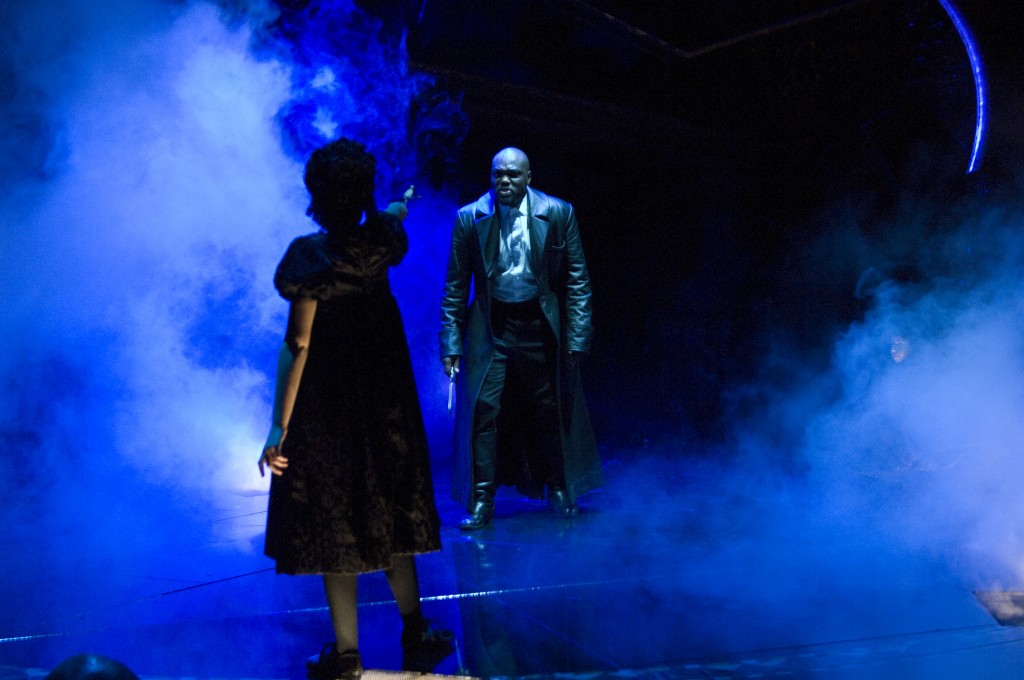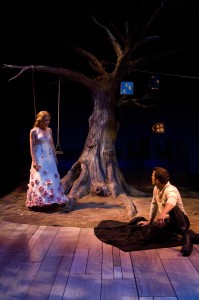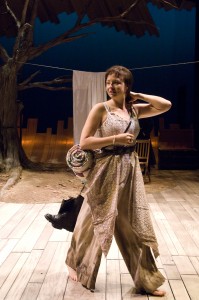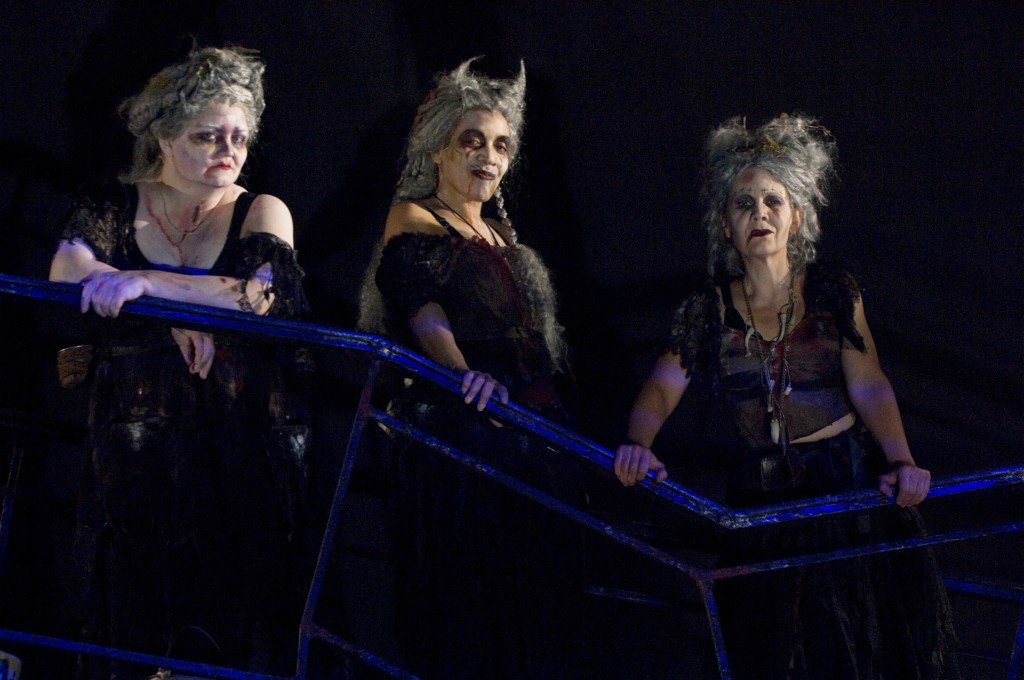
Above: Macbeth (Peter Macon) confronts a ghostly apparition in Ashland. Inset below: Diana (Emily Sophia Knapp) meets with Bertram (Danforth Comins). Photos: Jenny Graham/Oregon Shakespeare Festival/2009.
One of the advantages of visiting the Oregon Shakespeare Festival as late as I did this year is that every production (and I saw all nine still running in an 11-show season) was fully settled in, as ripe and ready as it’s ever going to be. Macbeth and The Music Man opened in February. The three outdoor shows opened in June.
Even the most recent addition to the repertory, Paradise Lost, began preview performances July 22, and I saw it Sept. 1. In most regional theater companies, with their three-week runs, it would’ve been shut down before then. Long live the extended run! (And so it will, for a while: Outdoor shows continue through Oct. 11, and the indoor season through Nov. 1, which gives you time and opportunity to make the southward jaunt.)
So what’s the score?
Overall, I think, this has been a strong season, and maybe more important, a promise of stronger seasons to come as Bill Rauch, who took over as artistic director last season, couples his ideas for change with the festival’s many existing strengths.
 This year we’ve seen some genuinely interesting directing approaches that put a strong personal stamp on the shows yet remain at the service of the literature — a hallmark (perhaps the hallmark) of the Ashland style. The season includes a couple of knockouts (Equivocation and The Servant of Two Masters), excellent work on the always problematical Macbeth and All’s Well That Ends Well, and illuminating moments of theater even in the least successful shows.
This year we’ve seen some genuinely interesting directing approaches that put a strong personal stamp on the shows yet remain at the service of the literature — a hallmark (perhaps the hallmark) of the Ashland style. The season includes a couple of knockouts (Equivocation and The Servant of Two Masters), excellent work on the always problematical Macbeth and All’s Well That Ends Well, and illuminating moments of theater even in the least successful shows.
Not that the season and company don’t have their problems, as Los Angeles Times critic Charles McNulty wrote a couple of weeks ago. His piece (read it here) has been racing across the Internet, ruffling feathers and wounding feelings among Ashland fans and company members alike.
In fact it’s a perceptive essay, and ought to be taken seriously. I don’t happen to agree with all of it, and it’s too bad it’s based on just a four-show sampling, with only Equivocation among the season’s best shows. McNulty also saw Henry VIII, which I thought beautifully designed and well-performed by its leads in a play that’s largely a losing cause; plus Paradise Lost and The Music Man.
But if McNulty chose to stress the festival’s faults over its achievements, I think it’s because he genuinely meant it as a challenge to improve. And he hit on several truths. When things go wrong the festival does fall back on a declamatory, connect-the-dots style that keeps the plot going but can drain the dramatic life from a show. That’s always seemed to me a product of the need to shout and gesture large on the big outdoor stage, although that’s become less a necessity since the addition several years ago of the Allen Pavilion, which cuts out a fair amount of the ambient noise. The problem is a bit like the one for grand opera: finding performers who can project into those massive spaces without straining or losing nuance. The bad habits sometimes get brought indoors, too: I felt some unnecessary vocal piercing, for instance, in Paradise Lost.
On the other hand, I think that what McNulty hears as shouting is sometimes instead a sort of classical fearlessness — a willingness to open up and play large with the language in an age that’s uncomfortable with hearts on sleeves (particularly in Los Angeles, home of the movie industry, where underplaying is a necessity of the film medium). Unlike a musical score, a play script doesn’t make notation of the range from pianissimo to triple forte: Matters of volume, contrast and vocal shape are for the director and performers to decide. That’s one of the reasons we argue about theater so much. But I’m willing to give festival talents such as Richard Elmore, Linda Alper, Robin Goodrin Nordli and Peter Macon first crack at figuring out the music in their roles (not that I might not argue with their choices after the fact).

Trouble, right here in River City: Harold Hill (Michael Elich) riles up the townfolk in “The Music Man.” Photo: Jenny Graham/Oregon Shakespeare Festival/2009.
There’s also sometimes the sense that if you lower the boom and give a show the run for its life that it deserves, the audience won’t be able to keep up. So you get, for instance, the festival’s literal and lifeless recent production of The Importance of Being Earnest, an over-earnest trotter that should have been a full-gallop romp.
And, yes, the quality of the 80-plus-actor company is variable. From William Hurt to Denis Arndt to Henry Woronicz to Marco Barricelli the festival has long had its legitimate leading men, but it’s always seemed to me primarily a company of highly skilled character actors. If that means that sometimes you want more juice in the glass — a little glandular oomph – it’s also a main attraction of the repertory system, which can be riveting for its adaptability and for the pleasures of watching familiar faces grow and surprise you in a variety of unfamiliar roles. It’s also notable that some of this season’s most successful shows featured relatively small casts with a fair amount of doubling.
 I’ve missed a few seasons in the past 35 years, but not many. Angus Bowmer, who founded the festival in 1935, had retired by the time I started my treks to Ashland, but he was still a regular face in the audience, and I chatted with him and his wife, Gertrude, several times. Jerry Turner had taken over as artistic director, and with the great gift in 1970 of the new indoor Bowmer Theatre added to the outdoor Elizabethan Stage, began to greatly expand the festival’s scope to include the likes of O’Neill, Strindberg, Ibsen, Shaw and other icons of the Western theater. The opening of the black-box Black Swan in 1977 (later replaced by the technically sophisticated New Theatre) made today’s eight-month seasons with their complex rotating reportories possible, and somewhere along the line world premieres and contemporary language-based plays became a regular part of the mix.
I’ve missed a few seasons in the past 35 years, but not many. Angus Bowmer, who founded the festival in 1935, had retired by the time I started my treks to Ashland, but he was still a regular face in the audience, and I chatted with him and his wife, Gertrude, several times. Jerry Turner had taken over as artistic director, and with the great gift in 1970 of the new indoor Bowmer Theatre added to the outdoor Elizabethan Stage, began to greatly expand the festival’s scope to include the likes of O’Neill, Strindberg, Ibsen, Shaw and other icons of the Western theater. The opening of the black-box Black Swan in 1977 (later replaced by the technically sophisticated New Theatre) made today’s eight-month seasons with their complex rotating reportories possible, and somewhere along the line world premieres and contemporary language-based plays became a regular part of the mix.
What’s remarkable is that Rauch is only the fifth artistic director in the festival’s three-quarters of a century, following Bowmer, Turner, Henry Woronicz and Libby Appel. That sort of stability is almost unheard of in a major arts institution, and if the downside is hidebound insularity (something that Appel, Rauch’s immediate predecessor, made a mission of reducing) the upside is the festival’s astonishing sense of who and what it is, and its determination to build on its own strong foundations.
Today’s festival is a long shot from Bowmer’s, or even Woronicz’s. But there’s a logic to how it got from there to here, and from what I’ve seen the past two seasons, Rauch is the right leader at the right time — sensitive to the traditions but willing to expand them with his own beliefs in world literature, people’s theater, social immediacy and the continuing vitality of semi-forgotten traditions such as commedia dell’arte.
A look at the final three shows not discussed in Parts One, Two, Three and Four of this series:
MACBETH
Who’d have guessed that Lady Macbeth would calm things down? Director Gale Edwards’ production of the Scottish Play begins in such a fury of overheated yelling and portentous music that I was almost ready to sneak out my cell phone and call the Melodrama Police or make a citizen’s arrest. Then Robin Goodrin Nordli strode onto the stage, intensely focused but calm and contained as the ultimate ambitious political wife, and everything snapped into place. Pace, sound, drama and delivery suddenly carried me inside this bloody drama, and enthralled by it, as I’ve seldom been before.
Peter Macon, also a standout as the athletic and amiable Don Pedro in Much Ado About Nothing, delivers an intensely musical, almost operatic performance as Macbeth. He’s as vigorous and nimble as a lion, but his performance is based in the language, and the language sings, swelling and fading and amplifying into its own emotional shape. Macon shows us Macbeth’s fears, and the trembling of his conscience, and once he’s done the initial dirty deed, the pleasure he begins to take in each succeeding atrocity.
Edwards leavens this headlong rush of a drama with an occasional stab of dark humor that most directors ignore, and even (in the case of Josiah Phillips’ amiable Porter and Doctor) with a little light comedy. Far from disrupting the play’s pell-mell rush into darkness, these touches throw welcome light on it.
I also very much like Scott Bradley’s urban wreckage of a set on the Bowmer stage, with its outer ring of flailing fallen bodies, which fade away or leap to consciousness according to Mark McCullough’s lighting cues. A vital, satisfying production, as Macbeth too seldom is.
THE MUSIC MAN
Yes and no. Michael Elich is a thoroughly enjoyable Harold Hill, in good voice and good humor and exuberant without being annoying. The school board’s barbershop quartet is smooth and harmonious, and there are fine supporting performances from festival stalwarts such as John Pribyl (the farmer and the anvil salesman), Linda Alper (Eulalie Mackecknie Shinn) and especially Anthony Heald as a bumbling, tongue-twisted Mayor Shinn.
But the undersized orchestra, while serviceable for the songs, is too thin and underpowered for the overture and entr’acte. And unfortunately Gwendolyn Mulamba is miscast vocally as Marian the Librarian — a key lapse. The production, which Rauch directs, is smooth and well-paced and provides a fair amount of comic and musical pleasure. But it never really takes off.
ALL’S WELL THAT ENDS WELL
Director Amanda Dehnert’s buoyant production in the New Theatre of Shakespeare’s “problem” comedy may be the season’s biggest and most pleasing surprise. Playing it in intimate three-quarter staging, Dehnert gets to the heart of the problem and instead of tugging at it gently unties the knot.
This is the play with the shotgun marriage and the runaway groom and the trick with the ring in a darkened bedchamber, where the faithless husband thinks he’s bedding an Italian beauty but is in fact romping with his own wife. A lot of directors make a big deal out of this scene, playing up its licentiousness and making out the husband, Bertram, to be a venal cad. Like a good Victorian novelist, Dehnert simply pulls a veil over it and moves on to more important matters of the heart.
The problem, as this production makes amply clear, is twofold. First, Bertram (Danforth Comins) is wrong to defy his king and family and run away from the bride whose virtues he refuses to see. But second, Helena (Kjerstine Rose Anderson) is equally wrong to trick him in the first place into a marriage he so clearly doesn’t want. Bertram had no say in this thing. He has a right to run, if he does so churlishly.
Most productions of All’s Well that I’ve seen look at Bertram as the problem and Helena’s continued pursuit of him as an affront to modern feminism. Dehnert sees it more clearly, I think, as a matter of trust and overcoming one’s rashest acts. Both Bertram and Helena need to grow up and learn some humility and compassion. In this production, his flight and her journey are truly pilgrimages toward the kind of wisdom that will allow love to flourish despite a false beginning. Dehnert’s approach is neither modern nor outmoded, feminist nor anti-feminist. And by broadening its outlook it takes the problem out of the play and replaces it with the joy of discovery.
With its simple props and silent-movie framework the production is also a pleasure theatrically. Lovely supporting performances come from Armando Duran (who also plays the title role in Don Quixote) as a clown/narrator/confidante; veteran James Edmondson as the king; John Tufts as the rascal Parolles; G. Valmont Thomas as the caustic Lafew; Dee Maaske as Bertram’s countess mother; and Kate Mulligan and Emily Sophia Knapp as the Italian widow and her alluring daughter, who aren’t about to let an abandoned wife be further wronged.

Something wicked this way comes: the witches (K.T. Vogt, Perri Gaffney, Robynn Rodriguez) in “Macbeth.” Photo: Jenny Graham/Oregon Shakespeare Festival/2009.